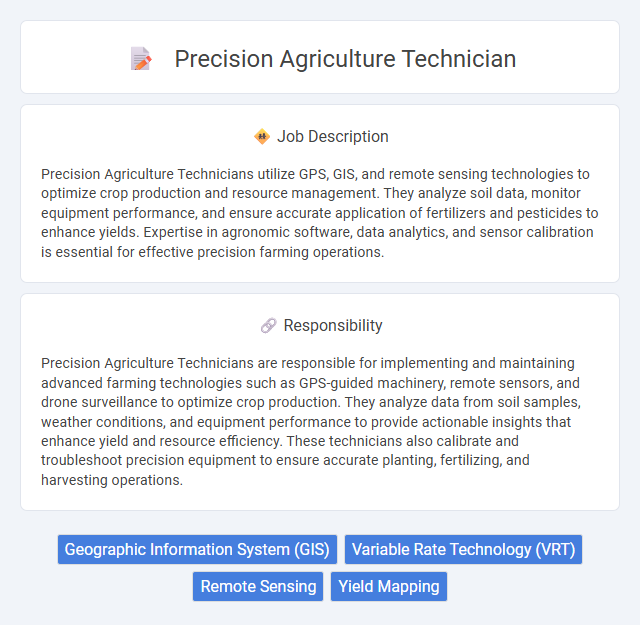
Precision Agriculture Technicians utilize GPS, GIS, and remote sensing technologies to optimize crop production and resource management. They analyze soil data, monitor equipment performance, and ensure accurate application of fertilizers and pesticides to enhance yields. Expertise in agronomic software, data analytics, and sensor calibration is essential for effective precision farming operations.
Individuals with strong analytical skills and a passion for technology are likely to thrive as Precision Agriculture Technicians. Those comfortable working outdoors and handling advanced equipment may find this role well-suited to their aptitudes. Candidates with adaptability and problem-solving abilities probably have a higher chance of success in this dynamic, tech-driven field.
Qualification
A Precision Agriculture Technician typically requires a degree or certification in agricultural technology, precision agriculture, or related fields, with strong knowledge of GPS systems, GIS mapping, and data analysis tools. Proficiency in operating drones, sensors, and farm management software is essential to optimize crop yields and sustainability. Practical experience in soil sampling, crop monitoring, and equipment calibration enhances the technician's ability to support precision farming initiatives effectively.
Responsibility
Precision Agriculture Technicians are responsible for implementing and maintaining advanced farming technologies such as GPS-guided machinery, remote sensors, and drone surveillance to optimize crop production. They analyze data from soil samples, weather conditions, and equipment performance to provide actionable insights that enhance yield and resource efficiency. These technicians also calibrate and troubleshoot precision equipment to ensure accurate planting, fertilizing, and harvesting operations.
Benefit
Precision Agriculture Technicians likely enjoy enhanced crop yields and reduced resource waste through advanced technology use. The role probably offers opportunities for skill development in GPS, GIS, and data analysis, increasing job marketability. Employers may provide competitive salaries and benefits as the demand for precision agriculture expertise grows.
Challenge
The Precision Agriculture Technician role likely faces challenges related to integrating rapidly evolving technologies with existing farming systems, requiring continuous learning and adaptability. Data accuracy and interpretation could be critical issues, as errors may impact crop yields and resource management. Additionally, unpredictable environmental factors might complicate the deployment and effectiveness of precision tools and techniques.
Career Advancement
A Precision Agriculture Technician leverages advanced technologies like GPS, GIS, and remote sensing to optimize crop production and resource management. Mastery of data analytics and familiarity with emerging agri-tech tools can lead to roles such as Precision Agriculture Specialist or Agronomic Consultant. Continuous skill development in drone operation, software applications, and sensor technologies enhances prospects for leadership positions and industry recognition.
Key Terms
Geographic Information System (GIS)
Precision Agriculture Technicians specializing in Geographic Information Systems (GIS) utilize advanced mapping and spatial analysis tools to enhance crop management and field productivity. They collect and interpret geospatial data to create accurate soil maps, optimize irrigation, and monitor crop health, improving resource efficiency. Expertise in GIS software such as ArcGIS and GPS technology is essential for implementing data-driven agricultural solutions.
Variable Rate Technology (VRT)
Precision Agriculture Technicians specializing in Variable Rate Technology (VRT) optimize crop yields by calibrating equipment to apply inputs like fertilizers and pesticides at site-specific rates. Expertise in GPS mapping, sensor data analysis, and prescription software enables precise adjustments tailored to soil variability and crop needs. Mastery of VRT enhances farm efficiency, reduces input costs, and promotes sustainable agricultural practices through data-driven decisions.
Remote Sensing
Precision Agriculture Technicians specializing in remote sensing utilize advanced tools such as drones, satellite imagery, and multispectral sensors to collect and analyze crop data, boosting farm efficiency and sustainability. They interpret remote sensing data to monitor soil health, crop growth, and pest infestations, enabling targeted interventions and optimized resource use. Expertise in GIS software and data analytics supports decision-making that enhances yield quality and reduces environmental impact.
Yield Mapping
Precision Agriculture Technicians specialize in yield mapping by utilizing GPS technology and data analytics to collect accurate crop yield data across different field zones. They process spatial data to identify yield variability, enabling farmers to make informed decisions on input application and field management. Expertise in software tools like GIS and yield monitors ensures precise data interpretation for optimizing agricultural productivity.
 kuljobs.com
kuljobs.com